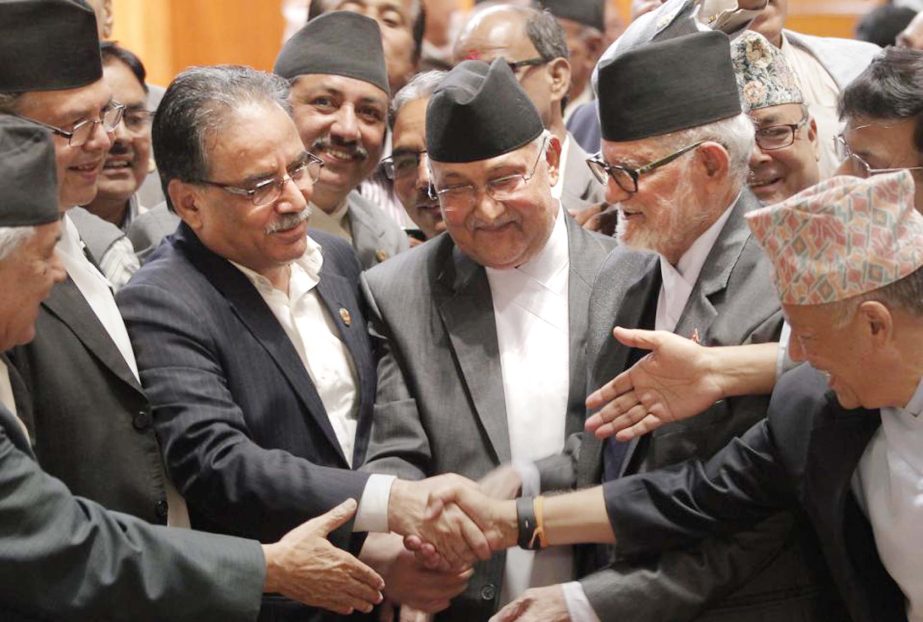
AP, Kathmandu :
Nepal’s parliament elected Communist party leader Khadga Prasad Oli the new prime minister Sunday, thrusting him into the center of daunting challenges, from ethnic protests over the new constitution that has also upset vital neighbor India to rebuilding from April’s devastating earthquake.
Oli received 338 votes from the 597-member chamber, Parliament speaker Subash Nemwang announced. Oli defeated his predecessor Sushil Koirala, who received 249 votes.
Oli, 63, is generally popular in Nepal and has a reputation for being an outspoken leader who is not afraid to criticize. Some describe him with the phrase, “Oli ko goli,” which means, “When Oli speaks he fires” (a bullet).
The leader of the Communist Party of Nepal Unified Marxist Leninist received the support of many smaller parties, including their rival United Communist Party of Nepal Maoist.
It is the first time that Oli has become the prime minister. He has served as deputy prime minister and ministers in previous governments. He suffers from a kidney illness and has had to make trips abroad for treatment to India and Thailand.
Oli and Koirala are leaders of the top two political parties and were coalition partners in the last government. Koirala became prime minister in 2014, but the constitution that was adopted last month required him to step down.
It was still undecided which other parties would join in Oli’s new government.
He comes to power at delicate time, with ethnic Madhesis and other groups in the south protesting against the new constitution in riots that have left 45 people dead. India, which has close ties to the Madhesis, is also unhappy with the constitution.
The country is facing a severe fuel shortage, thanks to an unofficial blockade by India and Madhesis blocking a key border checkpoint. Fuel and cargo trucks have been stopped at the border since late last month, after the constitution was approved.
The constitution approved Sept. 20 divides Nepal into seven new states, with some borders slicing through the Madhesis’ ancestral homeland in the southern plains along the border with India. The Madhesis, along with several other small ethnic groups, want the states to be larger and to be given more autonomy over local matters.
Talks last week between the government and protesters made little progress.
Nepal’s parliament elected Communist party leader Khadga Prasad Oli the new prime minister Sunday, thrusting him into the center of daunting challenges, from ethnic protests over the new constitution that has also upset vital neighbor India to rebuilding from April’s devastating earthquake.
Oli received 338 votes from the 597-member chamber, Parliament speaker Subash Nemwang announced. Oli defeated his predecessor Sushil Koirala, who received 249 votes.
Oli, 63, is generally popular in Nepal and has a reputation for being an outspoken leader who is not afraid to criticize. Some describe him with the phrase, “Oli ko goli,” which means, “When Oli speaks he fires” (a bullet).
The leader of the Communist Party of Nepal Unified Marxist Leninist received the support of many smaller parties, including their rival United Communist Party of Nepal Maoist.
It is the first time that Oli has become the prime minister. He has served as deputy prime minister and ministers in previous governments. He suffers from a kidney illness and has had to make trips abroad for treatment to India and Thailand.
Oli and Koirala are leaders of the top two political parties and were coalition partners in the last government. Koirala became prime minister in 2014, but the constitution that was adopted last month required him to step down.
It was still undecided which other parties would join in Oli’s new government.
He comes to power at delicate time, with ethnic Madhesis and other groups in the south protesting against the new constitution in riots that have left 45 people dead. India, which has close ties to the Madhesis, is also unhappy with the constitution.
The country is facing a severe fuel shortage, thanks to an unofficial blockade by India and Madhesis blocking a key border checkpoint. Fuel and cargo trucks have been stopped at the border since late last month, after the constitution was approved.
The constitution approved Sept. 20 divides Nepal into seven new states, with some borders slicing through the Madhesis’ ancestral homeland in the southern plains along the border with India. The Madhesis, along with several other small ethnic groups, want the states to be larger and to be given more autonomy over local matters.
Talks last week between the government and protesters made little progress.

